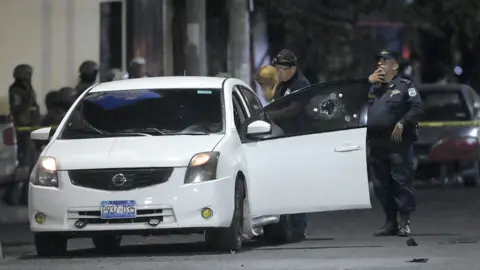El Salvador: State of emergency after 62 gang killings in a day
 Getty Images
Getty ImagesEl Salvador's parliament has approved a state of emergency after the Central American country recorded dozens of gang-related murders in a single day.
Police said there had been 62 murders on Saturday, making it the most violent 24-hour period since the end of the civil war in 1992.
New laws restrict the right to gather, allow arrests without a warrant and the monitoring of communications.
Last year, the gang-plagued nation recorded 1,140 murders - a 30-year low.
However, that still equates to 18 deaths per 100,000 inhabitants. In November, another spate of violence led to more than 40 people being killed within three days.
Hours before MPs voted on the new powers, which will remain in place for 30 days, police said four leaders of the Mara Salvatrucha (MS-13) gang had been arrested over the spate of killings.
President Nayib Bukele, elected in 2019 on promises to fight organised crime and improve security, said: "We have had a new spike in homicides, something that we had worked so hard to reduce.
"While we fight criminals in the streets, we must try to figure out what is happening and who is financing this."
The country "must let the agents and soldiers do their job and must defend them from the accusations of those who protect the gang members", he added, in the statement tweeted by Congress president Ernesto Castro.
However, Juan Pappier, from the international campaign group Human Rights Watch, tweeted the measures were "very worrying, especially in a country where there are no independent democratic institutions".
Authorities say the MS-13 and Barrio-18 gangs, among others, number about 70,000 members and are responsible for homicides, extortion and drug-trafficking.
Police said the latest bloodshed had left 12 people dead in the central department of La Libertad, as well as nine each in the capital, San Salvador, and the western department of Ahuachapan, with the other killings spread around the country.
In April 2020, as coronavirus swept through the country, President Bukele imposed a 24/7 lockdown for imprisoned gang members after more than 50 people were killed in three days.
He argued that many of the murders were ordered from behind bars and said prisoners belonging to rival gangs would be made to share cells in a bid to break up lines of communication.
